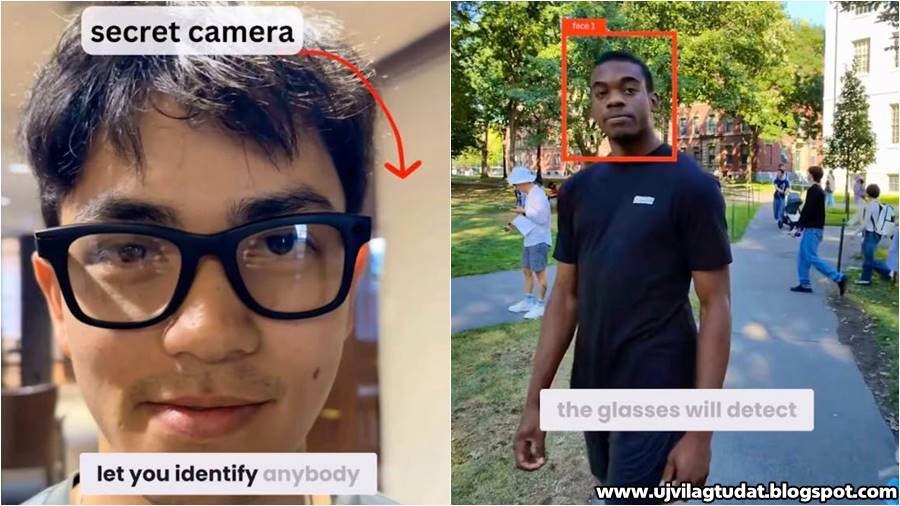Since Meta launched its smart glasses in 2021, data privacy concerns have been constantly present. Now, two Harvard students, AnhPhu Nguyen and Caine Ardayfio, have further heightened these concerns by developing a device called “I-XRAY.”
This new invention uses artificial intelligence and facial recognition software to reveal people’s identities and personal data in real time. The students demonstrated the technology in a video, which immediately exposes people’s names, addresses, work histories, and even their parents’ names.
The data privacy issues raised by I-XRAY are cause for concern, as this new technology shows how easily accessible people’s personal data is, based on just a photo or video. The glasses developed by Harvard students shed light on how advanced facial recognition and artificial intelligence technology has become today, and how it could impact our daily lives.
How does I-XRAY work?
When developing I-XRAY, the students combined various existing technologies to demonstrate how easily accessible people’s data is. The device is based on Meta Ray-Ban smart glasses, which appear no different from regular sunglasses. However, these glasses can capture three-minute videos and share them directly to Instagram.
The students used facial recognition software called PimEyes, which is a reverse image search tool. The software can recognize faces in the captured video and compare them with publicly available images on the internet. Once the face is identified, the artificial intelligence of I-XRAY immediately gathers additional personal data, such as the person’s name, occupation, and other information available online.
I-XRAY goes further by using an online database called FastPeopleSearch, which can extract information such as address, phone number, age, or even family members’ names based on just a name. All this data is collected in a mobile application developed by the students and is displayed in real time to the user.
The students showcased the technology in several videos. They approached unknown individuals at Harvard University and its surroundings, and within moments, uncovered their identities and personal data.
On one occasion, one of the students, Caine Ardayfio, approached a woman he had never seen before and addressed her by name, claiming they had met through a community foundation. The woman smiled and confirmed, likely under the belief that they had indeed met before. However, she was unaware that her data had been retrieved through artificial intelligence.
Data Privacy Concerns and Potential Misuse of Technology
Despite the students emphasizing that I-XRAY was not intended for commercial purposes but solely for raising awareness, the technology raises serious questions regarding data privacy. The project highlights how vulnerable people are in the online world, especially when their faces, names, and other personal data are easily accessible on the internet. This can be particularly dangerous if it falls into the wrong hands.
Fortunately, there is a way for individuals to remove their data from the PimEyes and FastPeopleSearch databases, thus protecting themselves from data privacy challenges posed by I-XRAY or similar systems. The students provide a step-by-step guide in their technological documentation on how to do this and encourage everyone to remove their data from databases for their own protection.
Meta’s Response and the Future of Data Privacy Regulation
In response, Meta emphasized that the smart glasses used by the students were heavily modified. The facial recognition and artificial intelligence technology used by I-XRAY is not part of the basic functions of Meta Ray-Ban. Furthermore, Meta stressed that similar facial recognition programs could work with other cameras, such as smartphones.
However, unlike smartphones, Meta’s smart glasses are more discreet and can more easily evade people’s attention when recording. While Meta has incorporated an LED light and an auditory notification to alert when the glasses are recording, these signals are subtle, and many may not understand their significance.
The development of smart glasses has raised concerns among data privacy experts. Jake Moore, a security consultant at ESET, expressed to the public that smart glasses capable of recording and identifying the public are a “worrisomely dangerous development.” According to him, as technology advances and individuals become more easily identifiable, these devices could easily fall into the wrong hands and enable abuse.
While Meta has implemented some security mechanisms, such as the LED light that users cannot turn off and a tamper sensor to prevent recording, these measures only partly reassure the public. People need to recognize that the continuous evolution of technology allows for their personal data to become easily accessible, often without their knowledge.
Nguyen and Ardayfio’s project sheds light on an important question: Are we ready for a world where our personal data can be uncovered in an instant? Through I-XRAY, we can see that the future is here, and the question of data privacy is more crucial than ever. Balancing technological advancement with privacy protection will be one of the greatest challenges in the coming years.
💘Love
💘Love
😡Angry
😡Angry




